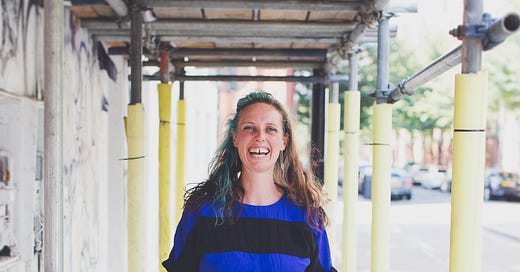If you are a woman your pain won't be heard.
Sometimes, I think I don’t know what I want to talk about. Perhaps there’s just so much to say that I get overwhelmed. I also often feel like I’m shouting into an empty cupboard on social media—which is ironic, given its name.
But I needn’t have panicked. The subject matter presented itself to me within 10 seconds of opening my Google alerts. And, as usual, it made me take a deep, resounding sigh—because the language was so bloody boring.
Admittedly, this was a podcast from a pharmaceutical company promoting a new way to treat uterine fibroids with ultrasound. And, to be fair, that’s amazing. It’s far less invasive than existing treatments, and from what I can see, it’s a total win all around.
But then I saw the headline:
‘This procedure is helping women to stop normalising their discomfort.’
There are so many things wrong with this sentence that I barely know where to begin.
For starters, I don’t think a single woman suffering from fibroids, endometriosis, adenomyosis, or dysmenorrhoea (the medical term for painful periods) has ever thought, Oh yes, this level of agony is totally normal. If you scratched the surface of any woman’s experience with chronic period pain, you’d find a rap sheet as long as your arm detailing visits to GPs, trips to A&E, and desperate searches for answers—only to be told, This is just what being a woman is like.
Pain that drives you to seek medical help is normal?
Is it, though?
You don’t have to dig far to uncover the staggering statistics about how women’s pain is disproportionately dismissed—not just with periods but across the board. Women suffering from heart attacks, for example, are less likely to be believed or treated promptly. Chronic illnesses, autoimmune conditions, and even post-surgical pain are routinely downplayed when the patient is a woman.
And here’s the thing—a procedure won’t fix the fact that women aren’t believed. It won’t change the reality that when you sit across from a doctor and say, I am in pain, they might gaslight you into thinking your experience is exaggerated, imaginary, or just part of being female. And when you hear that enough times, from different people, where do you go with that? At this point, I think many women would rather talk to the bloody machine—it might at least offer more sympathy.
Let me be clear: women are not the problem here. It isn’t your fault that you have painful periods. It isn’t your fault that you’re banging your head against the patriarchal beast that is the medical profession. And it certainly isn’t your fault if you feel jaded, exhausted, and fed up.
In my work, I routinely have women sobbing down the phone to me—not because I’m doing anything extraordinary, but simply because I listen and believe them. That shouldn’t be remarkable. But I’ve lived this experience myself, and I will keep banging this drum until my last breath.
Women’s pain has been normalised. We are pitted against each other in all facets of life, and this normalisation chips away at our confidence and self-worth. It doesn’t just have long-term effects on our well-being—it erodes the trust we should be able to place in healthcare professionals.
Pain is nuanced. It’s your body communicating with you. If you stub your toe, you expect it to hurt. If it’s still excruciating two weeks later, you’d go to a doctor, expecting reassurance, a diagnosis, and treatment. The pain would subside, and healing would begin. But when it comes to period pain? The expectation is different.
There is an air of disbelief, gaslighting, looking in the wrong areas. Even when the person in front of you is saying it’s my periods. They will check for IBS, this why things take so bleedy long. We just aren’t always believed.
And this is the sneaky nature of what’s at play in healthcare—the capitalism, the patriarchy, the racism, and the impunity with which these systems operate. It’s disgusting. It is not our burden to carry—it is for the healthcare system to do better.
If you’re looking for an alternative way to work with your periods and hormones, I have spaces available. I don’t operate a ‘them or us’ service—I work with you, wherever you’re at. The Well Woman Project puts nuance at the forefront, because your experience deserves more than a one-size-fits-all approach.




